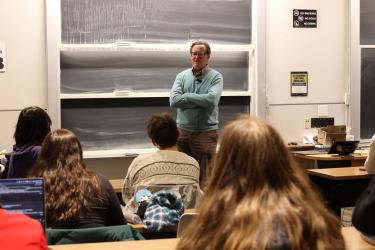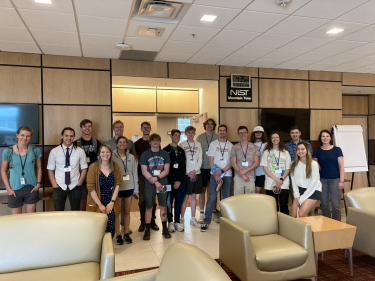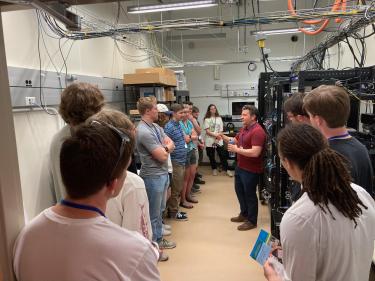Generous commitment from SPIE, the international society for optics and photonics, supports future growth for CU Boulder's Quantum Scholars Program.
The Quantum Scholars Program has received a big boost in the form of a matching gift from SPIE, the international society for optics and photonics. SPIE has committed to matching $100,000 in external gifts to the program over the next two academic years. This generous contribution will provide scholarships for up to 20 additional Quantum Scholars each year.
 "SPIE believes strongly in the role optics and photonics will play in the future of quantum technologies and shares CU Boulder's vision for building a robust quantum infrastructure by encouraging outstanding young physicists and engineers to enter the field,” says Kent Rochford, CEO of SPIE. “We are thrilled to partner with them on their Quantum Scholars program and hope our matching grant will motivate other donors to support this innovative program."
"SPIE believes strongly in the role optics and photonics will play in the future of quantum technologies and shares CU Boulder's vision for building a robust quantum infrastructure by encouraging outstanding young physicists and engineers to enter the field,” says Kent Rochford, CEO of SPIE. “We are thrilled to partner with them on their Quantum Scholars program and hope our matching grant will motivate other donors to support this innovative program."
Currently in its second year, the Quantum Scholars Program was created in 2022 through a collaboration between the Department of Physics and the College of Engineering and Applied Science.
Quantum Scholars supports undergraduates in physics, engineering and computer science with the aim to advance quantum education and workforce development through professional development, co-curricular activities, and industrial engagement. Scholarship support is a key component of the program to recruit and retain students interested in the quantum industry.
Mike Ritzwoller, Professor of Distinction and former Chair of Physics, helped launch Quantum Scholars and currently serves as a faculty advisor to the program along with Professor Noah Finkelstein. Ritzwoller says “Students have responded to the Quantum Scholars program with incredible enthusiasm. This generous SPIE award provides a great opportunity to sustain and scale the Quantum Scholars program, investing in the future of science and engineering, and most importantly the people committed to this future.”
Keith Molenaar, Dean of the College of Engineering and Applied Science, who launched Quantum Scholars with Professor Ritzwoller, says “The Quantum Scholars program is fostering a remarkable community to address the quantum workforce development need.” He adds “We appreciate SPIE’s vision and commitment to this partnership and look forward to expanding the program’s impact.”
A growing demand
Growth in the quantum industry has been extensive in recent years and continues to increase. Additional focus with the recent designation of Colorado as a Quantum Tech Hub has reinforced the critical need for education and training in the quantum field.
Demand for the Quantum Scholars Program is substantial. About 50 physics and engineering undergraduates are in the program this year, with approximately half receiving a scholarship. Professor Ritzwoller hopes that with external support the program can be expanded to provide 50 scholarships per year over the next few years. Tobin Munsat, Professor and Chair of Physics, says “We’re so appreciative of SPIE for supporting this terrific program, and helping us to develop the next generation of quantum scientists.”
Expanding program activities
Professional development and industrial engagement activities offered by the Quantum Scholars program include talks from quantum scientists from CU, national labs, and industry as well as tours of national labs and quantum companies. In recent months, leaders from Vescent, IonQ, and Infleqtion have visited the Quantum Scholars to share recent advancements and their perspectives on research, careers, and the quantum industry.
 The annual Physics and Quantum Career & Internship Fair extends connections beyond visits to the program to help students explore a career in the quantum industry.
The annual Physics and Quantum Career & Internship Fair extends connections beyond visits to the program to help students explore a career in the quantum industry.
Additional community-building activities have launched from connections made in the program including the Quantum Scholars Quantum Hackathon, which kicked-off in spring 2024. Quantum Scholars Annalise Cabra and Denali Jah have taken on leadership roles in organizing the Quantum Hackathon.
The hackathon spans four weeks with students organized in teams of three or four and paired with a graduate student advisor. Students learn the fundamentals of quantum computing during the first few weeks, then tackle a quantum challenge during the fourth week.
Third-year physics student Annalise Cabra says “Quantum Scholars has been one of my most valuable experiences outside of the classroom. I am eager to see the continued growth of the program, especially during this groundbreaking era of quantum technology development.”
Looking forward
Support for the Quantum Scholars Program enables students to engage in a program that complements the education they receive in the classroom or research lab and propels them as they enter the quantum field in industry or through further education. The generous commitment from SPIE combined with external support will help the program thrive for years to come.
Get involved
Questions about getting involved in the Quantum Scholars Program as a student, industry partner, or supporter can be directed to Professor Mike Ritzwoller.
